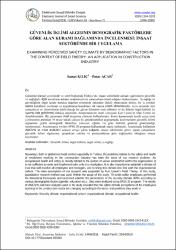| dc.contributor.author | Kılıç, Samet | |
| dc.contributor.author | Acar, Pınar | |
| dc.date.accessioned | 2021-03-11T20:13:21Z | |
| dc.date.available | 2021-03-11T20:13:21Z | |
| dc.date.issued | 2019 | |
| dc.identifier.issn | 1304-0278 | |
| dc.identifier.issn | 1304-0278 | |
| dc.identifier.uri | https://doi.org/10.17755/esosder.453410 | |
| dc.identifier.uri | https://app.trdizin.gov.tr/makale/TXpFMk9UZzRPQT09 | |
| dc.identifier.uri | https://hdl.handle.net/20.500.12879/27 | |
| dc.description.abstract | Günümüz küresel çevresinde ve yerel bağlamda Türkiye’de, inşaat sektöründe çalışan işgörenlerin güvenlik ve sağlığıyla ilgili sorunların artması araştırmamızın sorunsalının temel odağını oluşturmuştur. İş sağlığı ve güvenliğinin örgüt içinde kurulan değerler sistemiyle yakından ilişkili olmasından dolayı, bir iş yerinde sadece kuralların yazılması ve uygulamaya konulması tek başına yeterli olmamaktadır. Aynı zamanda tüm çalışanların ve yöneticilerin dahil olacağı bir güven ikliminin tesis edilmesi ve bu iklimin örgüt kültürü ile uyumlu hale getirilmesi oldukça önemlidir. Araştırmamızın temel varsayımı Kurt Lewin’in Alan Teorisi ile desteklenmiştir. Bu çalışmada nicel araştırma yöntemi kullanılmıştır. Konu kapsamında teorik çerçevenin çizilmesinin ardından 79 beyaz yakalı çalışan ile gerçekleştirilen uygulamada, katılımcıların güvenlik iklimi algılarının çeşitli demografik faktörlere (cinsiyet, eğitim vs) göre farklılık gösterip göstermediği incelenmiştir. Araştırmanın verileri SPSS 20 programı kullanılarak analiz edilmiştir. Araştırmada kullanılan ANOVA ve t-test analizleri sonucu ortaya çıkan bulgular, inşaat sektöründe görev yapan çalışanların güvenlik iklimi algılarının, çalıştıkları sektöre ve pozisyonlarına göre değişmekte olduğunu ortaya koymuştur. | en_US |
| dc.description.abstract | Nowadays, both in global and local context especially in Turkey, the problems related to the safety and health of employees working in the construction industry has been the basis of our research problem. As occupational health and safety is closely related to the system of values established within the organization, it is not sufficient to write and implement rules only in a workplace. It is also important to establish a climate of trust that will involve all employees and managers, and to bring this climate into line with the organizational culture. The main assumption of our research was supported by Kurt Lewin's Field Theory. In this study, quantitative research method was used. Within the scope of the study, 79 white-collar employees performed the theoretical framework and examined whether the perceptions of the security climate differ according to various demographic factors (gender, education etc.). Data were analyzed using SPSS 20 program. The results of ANOVA and t-test analyzes used in the study revealed that the safety climate perceptions of the employees working in the construction sector are changing according to the sector and positions they work in. | en_US |
| dc.language.iso | tur | en_US |
| dc.rights | info:eu-repo/semantics/openAccess | en_US |
| dc.subject | İş | en_US |
| dc.title | Güvenlik İklimi Algısının Demografik Faktörlere Göre Alan Kuramı Bağlamında İncelenmesi: İnşaat Sektöründe Bir Uygulama | en_US |
| dc.title.alternative | Examining Perceived Safety Climate By Demographic Factors In The Context Of Field Theory: An Application In Construction Industry | en_US |
| dc.type | article | en_US |
| dc.contributor.department | Beykoz Üniversitesi İşletme ve Yönetim Bilimleri Fakültesi | en_US |
| dc.contributor.institutionauthor | Acar, Pınar | |
| dc.identifier.doi | 10.17755/esosder.453410 | |
| dc.identifier.volume | 18 | en_US |
| dc.identifier.issue | 71 | en_US |
| dc.identifier.startpage | 1066 | en_US |
| dc.identifier.endpage | 1088 | en_US |
| dc.relation.journal | Elektronik Sosyal Bilimler Dergisi (elektronik) | en_US |
| dc.relation.publicationcategory | Makale - Ulusal Hakemli Dergi - Kurum Öğretim Elemanı | en_US |


















